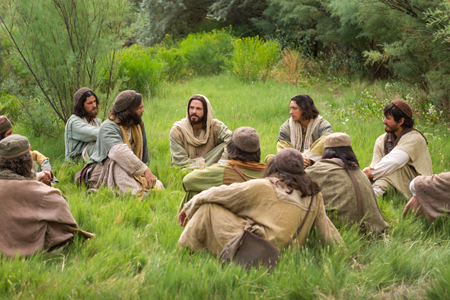 How did a 1st century A.D. blind man get faith to be healed?
How did a 1st century A.D. blind man get faith to be healed?
The Role of Faith. Before we try to answer, let’s look at the important role of faith in the healings Jesus performed. Typically, it was the sick person’s faith to which Jesus responded: the leper’s (Mark 1:40), the bleeding woman’s (5:28), crowds of sick in Gennesaret (6:55), etc.
On other occasions, Jesus responded to the faith of someone associated with the sick: the friends of the paralytic (2:1-12), the Syrophoenician mother whose daughter was demonized (7:24-30), the crowds who brought a deaf man to Jesus (7:32), people who brought a blind man to Jesus at Bethsaida (8:22), the father of the boy with an unclean spirit (9:24).
Then, at least twice Jesus healed without anyone believing. Such was the case of the man with a withered hand (3:1-6) and the demoniac in Gerasene country (5:1-20). But Mark also reports that in Nazareth “he could do no mighty work . . . And he marveled because of their unbelief” (6:5,6). However we try to understand that seeming contradiction, we can at least say that Jesus had no “cookie-cutter” approach when it came to the matter of faith for healing. But we also are compelled to say that normally faith was required.
Interpretation of the Text. That brings us to the incident about a blind man Mark recorded in 10:46-50 . . .
Then they came to Jericho. As Jesus and his disciples, together with a large crowd, were leaving the city, a blind man, Bartimaeus (that is, the son of Timaeus), was sitting by the roadside begging. When he heard that it was Jesus of Nazareth, he began to shout, “Jesus, Son of David, have mercy on me!” Many rebuked him and told him to be quiet, but he shouted all the more, “Son of David, have mercy on me!” Jesus stopped and said, “Call him.” So they called to the blind man, “Cheer up! On your feet! He’s calling you.” Throwing his cloak aside, he jumped to his feet and came to Jesus. “What do you want me to do for you?” Jesus asked him. The blind man said, “Rabbi, I want to see.” “Go,” said Jesus, “your faith has healed you.” Immediately he received his sight and followed Jesus along the road (Mark 10:46-52).
Before returning to our original question, a couple of interpretation issues. First, the original Greek word the ESV translates “made you well” is sozo. In general it means “save, preserve, rescue from danger.” It’s the usual word that refers to salvation. For example, Paul uses it in Ephesians 2:8—“For it is by grace you have been saved, through faith– and this not from yourselves, it is the gift of God . . . ” In relation to sickness word is translated “heal, make well, restore to health.” The ESV translates it “made you well.” The NIV, “healed.” Jesus’ statement, “your faith has made you well”, makes faith the active contribution for healing from Bartimaeus.
That Bartimaeus had faith is obvious. For one thing, at least twice he shouts. “Jesus, Son of David, have mercy on me!” “Son of David” here is a messianic title, so Bartimaeus is expressing faith that Jesus is the Messiah who can open blinded eyes (“Then the eyes of the blind shall be opened . . . “—Isaiah 35:5). For another thing, when Jesus asks, “What do you want me to do for you?”, Bartimaeus’ answer, “Rabbi, I want to see”, implies faith that Jesus could open his eyes.
Final interpretation issue: Bartimaeus’ faith was in Jesus. It wasn’t “the power of positive thinking.” It wasn’t “name it and claim it”. It wasn’t an emotion Bartimaeus worked up within himself until he could just see himself seeing. It was faith in the person of Jesus as Messiah who, therefore, was able to open blind eyes.
Question & Answer. Now to our original question: “How did that 1st century A.D. blind man get faith to be healed? He couldn’t read Scriptures about Messiah’s power. He couldn’t see the miracles Jesus performed for others. We might quickly answer that, according to Ephesians 2:8,9, faith is God’s gift: “For by grace you have been saved through faith. And this is not your own doing; it is the gift of God, not as a result of works, so that no one may boast.” However, there’s a bit of ambiguity there: does “it is the gift of God” refer only to being saved or also to faith?
I suggest Bartimaeus’ faith came from hearing what others “gossiped” all over the place about Jesus. He was undoubtedly the topic of water cooler conversation! Bartimaeus’ eyes were broken, but his ears worked just fine. And thus Bartimaeus fulfilled Paul’s words in Romans 10:17—“So faith comes from hearing, and hearing through the word of Christ.” So that day, having heard about Jesus of Nazareth, he heard conversation that told him Jesus was right there! That’s when he cried out. And about a minute later, that’s when he saw Jesus.
* * * * *
Jesus, Son of David, have mercy on me.
Enable me to believe that you still stop and listen when I cry.
Enable me to believe you still want me to tell you what I long for you to do for me.
Enable me to keep asking when everything around me and in me says, “Give it up!”
Enable me to believe you still open blind eyes and make a cripple walk.
And give me a quiet, rock-like confidence to believe
that if you don’t answer me today, on that Day, you will.
Amen.







Recent Comments